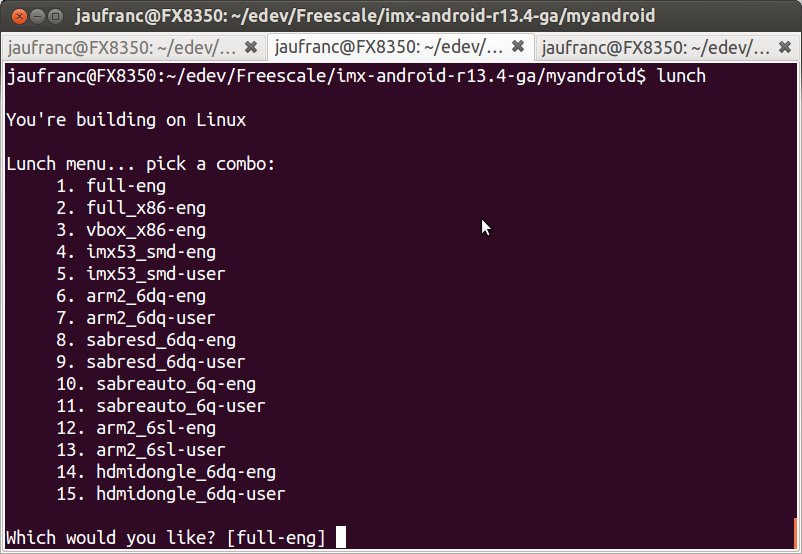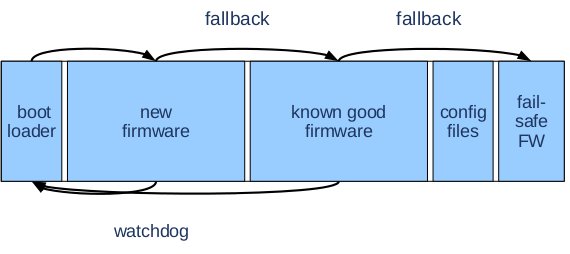We can now get some quad core Android mini PCs (e.g. Hi802, GK802) featuring Freescale i.MX6Q processor, Freescale has released full documentation and source code its development platforms, Hi802 / GK802 HDMI TV dongles are easily hackable, and there’s even an Ubuntu image for the devices. So it looks pretty good ,right? Well almost.. there are some patches and config for GK802 that have not been released by Richtechie, so we can’t modify the bootloader and Linux kernel. But this may change, as ARMTvTech forum user hste noticed some Freescale i.MX6 HDMI dongle patches om IMX Community website. Even though I’m not sure those are fully compatible with Hi802 / GK802, this could be a starting point. Today, I’ll provide the instructions to build u-boot, the linux kernel and Android ICS with those patches in a machine running Linux 12.04 64-bit. Patch Sets Descriptions There are two set of patches that […]
linaro-android-tools Scripts Upgrade Android Kernel & Initrd via ADB
With Linaro 13.01 release, Linaro announced linaro-android-tools (aka Kernel Update Tools), a set of tools to improve development time for kernel developers. Today, they published a blog post explaining those scripts allow developers to update the kernel without having to take out the SD card from their development board, and instead update the firmware via ADB with a PC connected via the network or USB. Currently there are 2 shell scripts: update-android.sh – To update kernel files in boot partition such as boot.tar.bz2, single files (e.g. uImage) or kernel modules. Usage:
|
1 2 3 4 5 6 |
update-android.sh [--serial|-s serial] [--partition|-p boot-partition] <boot.tar.bz2|uImage|board.dtb|...> Update the kernel files in the boot partition of the specified android device with the specified boot.tar.bz2 file update-android.sh [--serial|-s serial] kernel-source-directory Push all the module files in the specified kernel directory into the /system/modules directory of the specified android device |
For example:
|
1 |
./update-android.sh out/target/product/pandaboard/boot.tar.bz2 |
update-uInitrd.sh – To update files in the initrd Usage:
|
1 2 3 4 5 |
update-uInitrd.sh [--serial|-s <serial>] [--partition|-p <boot-partition>] [--target|-t <target-file>] <source-file> Update the target file in uInitrd of the specified device with the specified source file When the target file is not specified, will update the file in the root directory that has the same file name of the source file |
For example:
|
1 |
./update-uInitrd.sh /tmp/init.rc |
Those 2 scripts are available in Linaro git repository:
|
1 |
git clone http://android.git.linaro.org/git-ro/platform/external/linaro-android-tools.git |
Currently the scripts only support Pandaboard, Origen, Versatile Express, and Versatile Express A9 boards,but they could be easily modified to support other boards supporting linaro packages. Jean-Luc Aufranc (CNXSoft)Jean-Luc started CNX Software […]
Linaro 13.01 Release with Linux Kernel 3.8 and Android 4.2.1
Linaro has just announced release 13.01 which includes Linux Kernel 3.8-rc4 and Android 4.2.1. A lot of work seems to have gone in Arndale board and OpenEmbedded ARMv8. It’s the first time an Ubuntu image is released for Arndale Cortex A15 development board. One the kernel side some Android upstreaming work has been done, as well as some fixes for eMMC, and code for ST Ericsson Novathor 8500 SoC has been reorganized. Version 14 of the big.LITTLE MP (Multi Processing) has been released. The LEG has done further work on Linaro UEFI and GRUB. Here are the highlights of this release: Android Platform Work The first step of the android-build front-end update for new build program has been landed. Origen and Versatile Express manifests have been consolidated into a single manifest. linaro-android-tools were developed to improve development time for kernel developers. See Kernel Update Tools for details. The android-build scripts […]
Embedded Linux Conference 2013 Schedule
The Embedded Linux Conference (ELC 2013) will take place on February 20 – 22, 2013 at Park 55 Hotel in San Francisco, California. ELC consists of 3 days of presentations, tutorials and sessions. There will be over 50 sessions during those 3 days. I’ll highlight a few sessions that I find particularly interesting, and that did not get presented at ELCE 2012 (AFAICR). February 20 11:00 – Anatomy of the arm-soc git tree by Olof Johansson, Google We are now two years into the new maintainer model for ARM platforms, and we have settled down into a workflow that maintainers have adjusted well to. Still, when new platforms arrive, or when maintainer ship changes hands, there’s sometimes a bit of ramp-up in getting used to how we organize our git tree and how we prefer to see code submitted to fit that model. This presentation will give an overview of […]
LTSI 3.4 is Now Available for Download
Nearly 2 years ago, the Linux Foundation’s Consumer Electronics (CE) working group created the Long Term Support Initiative (LTSI) Linux kernel for consumer electronics devices in order to have a common stable platform released every 2 years, and share the kernel development work among competing companies including Hitachi, LG Electronics, NEC, Panasonic, Qualcomm Atheros, Renesas Electronics Corporation, Samsung Electronics, Sony and Toshiba. Last week, the CE working group has released LTSI 3.4 kernel, based on Linux 3.4.25 kernel release and including several backported features from newer kernels including: The Contiguous Memory Allocator (CMA), which is extremely useful for embedded devices that have very limited hardware resources and will better handle the large memory requirements of multimedia applications. CMA originally was merged into the 3.4.0 kernel release, but its functionality was quite limited. Since then, the feature has been significantly improved in the kernel.org releases and those fixes have been added to […]
Yocto Project Overview and Update – ELCE 2012
Last post about ELCE 2012 videos… David Stewart, manager of the Yocto Project team within the Open Source Technology Center at Intel, gives an introduction to the Yocto Project, as well as a status update at ELCE 2012. Abstract: The Yocto Project is a joint project to unify the world’s efforts around embedded Linux and to make Linux the best choice for embedded designs. The Yocto Project is an open source starting point for embedded Linux development which contains tools, templates, methods and actual working code to get started with an embedded device project. In addition, the Yocto Project includes Eclipse plug-ins to assist the developer. This talk gives a walk-through of the key parts of the Yocto Project for developing embedded Linux projects. In addition, features will be described from the latest release of the Yocto Project, v1.3. The talk will include demos of some of the key new […]
BoFs: Developer Tools and Methods: Tips & Tricks – ELCE 2012
Tim Bird, senior staff software engineer at Sony Network Entertainment, hosts a BoF session about tools & methods for embedded Linux developers at ELCE 2012. Abstract: In this Birds-of-a-Feather-session, Tim will share some of his favorite tips for developing embedded Linux software. This will include tips for using ‘git’, how he does multi-platform development, and tips for other tools that other developers might find useful. Prior to the event, Tim will do a survey and solicit ideas from other developers as well. Please come to this BoF prepared to share your own productivity tips for embedded Linux development. Tim talks is divided into the following key points: Git tips – How to finds info about commits (git log, git show), use aliases (e.g. for colored output), find a commit that caused problem (git bisect), and more Patch management – quilt patch managing tool, diffinfo, and splitpatch (to break patches apart) […]
Upgrading Embedded Linux Without Bricking – ELCE 2012
Arnout Vandecappelle, senior embedded software architect at Essensium/Mind, talks about ways to greatly decrease the risk of bricking your board/device during upgrade thanks to gubies scripts and tools at the Embedded Linux Conference in Barcelona, Spain, on November 6, 2012. Abtract: Embedded systems are often modified remotely, e.g. to upgrade the firmware or change the configuration. This may however break the system and render it inaccessible, which is a major problem if the device is hard to reach physically. Unfortunately, no catch-all failsafe solution exists to make sure that the device stays accessible remotely even if a modification goes wrong. Instead, the possible failures have to be anticipated and covered. This talk discusses some of the frequently occurring failures, how they can be detected and handled. These include power failure, kernel crashes, network failure and data corruption. We include examples of concrete use cases. Finally, there is room for discussion about […]






